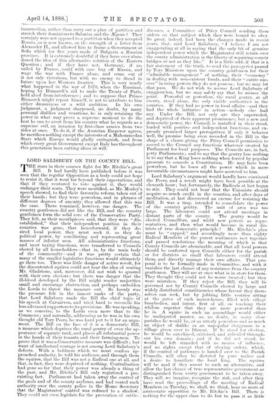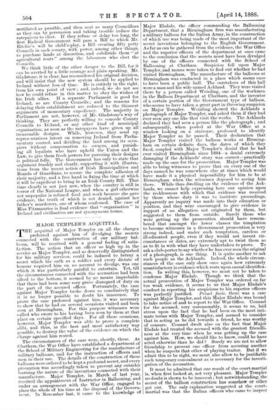LORD SALISBURY ON THE COUNTY BILL. T HE stars in their
courses fight for Mr. Ritchie's great Bill. It had hardly been published before it was seen that the regular Opposition as a body could not hope to resist it, that it went far beyond their expectations, and that if they ventured to vote against it, they would endanger their seats. They were mortified, as Mr. Morley's speech showed, to find their favourite reform taken out of their hands ; but they were powerless, and in phrases of different degrees of amenity, they allowed that this was the case. There remained, however, one danger. The country gentlemen did not like the Bill, and the country gentlemen form the solid core of the Conservative Party. They felt, as their mouthpieces said, that they were " dis- established," that their independent position in their counties was gone, that henceforward, if they de- sired local power, they must seek it, as they do political power, by conciliating and representing great masses of inferior men. All administrative functions, and most taxing functions, were transferred to Councils elected by all householders—that is, by the main body of the commonalty—and it was pretty certain that many of the smaller legislative functions would ultimately go there too. There was little danger of active revolt, for the discontented squires could not bear the idea of seating Mr. Gladstone, and, moreover, did not wish to quarrel with their own electors ; but there was danger that the ill-blood developed by the Bill might render majorities small and encourage obstruction, and perhaps embolden the Lords to throw the measure out. So keenly was the pressure felt in the inmost ranks of the party, that Lord Salisbury made the Bill the chief topic of his speech at Carnarvou, and tried hard to reconcile his less advanced supporters to its provisions. He was speaking, as we conceive, to the Lords even more than to the Commons ; and naturally, addressing as he was in his own thought old Tory Peers, he was hard put to it for an argu- ment. The Bill on the face of it is a democratic Bill, a measure which deprives the rural gentry of even the ap- pearance of separate rank, and places all substantial power in the hands of their tenants and their farming-men. To prove that it was a Conservative measure was difficult ; but want of intellectual courage is not among Lord Salisbury's defects. With a boldness which we must confess ap- proached audacity, he told his audience, and through them the squires, that the Bill was not a Radical one at all, and that, in fact, they were deprived of nothing. Centralisation had gone so far that their power was already a thing of the past, and Mr. Ritchie's Bill only registered a pre- existing fact. Parliament had taken away the control of the gaols and of the county asylums, and had vested such authority over the county police in the Home Secretary that the Magistrates' control was reduced to a shadow. They could not even legislate for the prevention of cattle- diseases, a Committee of Privy Council sending them orders on that subject which they were bound to obey. So great, indeed, had been the changes made in recent years, that, said Lord Salisbury, " I believe I am not exaggerating at all in saying that the only bit of genuine independent power which the Magistrates still retain over the county administration is the liberty of repairing county bridges or not as they like." It is a little odd, if that is a. fair statement of the truth, to read the panegyrics passed by Tory Ministers upon the country gentlemen for their " admirable management " of nothing, their "economy" in dealing with non-existent funds, and their " entire suc- cess " in using powers they do not possess ; but we may let that pass. We do not wish to accuse Lord Salisbury of exaggeration, but we may safely say that he misses the point. Powerful or powerless, the rural gentry, at all events, stood alone, the only visible authorities in the counties. If they had no power in local affairs—and they had the whole initiative in action—nobody else had any. Under the Bill, not only are they superseded, and deprived of their apparent prominence, but a new and democratic power, the Council, is installed in their stead, loaded with positive and independent functions, and ex- pressly promised larger prerogatives if only it behaves well, the promise being even recorded in the Bill in the shape of a clause giving the Privy Council permission to accord to the Council any functions whatever created by Parliament for local purposes. The Councils are, in fact, petty Parliaments ; and to say that the gentry lose nothing is to say that a King loses nothing when forced by popular pressure to concede a Constitution. He may have been powerless, but he loses all the power which in more favourable circumstances might have accreted to him.
Lord Salisbury's argument would hardly have convinced the Peers, and a revolt might have been possible at the eleventh hour ; but, fortunately, the Radicals at last began to stir. They could not bear that the Unionists should acquire so much credit in the counties, and after days of meditation, at last discovered an excuse for resisting the Bill. It was a trap, intended to consolidate the power of the country gentry. The unit of area was too large. The labourers could not attend meetings in distant parts of the county. The gentry would be elected Councillors, and wield new powers as repre- sentatives, and then what would become in rural dis- tricts of true democratic principle ? Mr. Ritchie's plan must be " capped," and accordingly more than eighty Radical Members of the purest sentiments met together and passed resolutions the meaning of which is that County Councils are abominable, and that all local powers should be conferred upon Councils either for the parish or for districts so small that labourers could attend them, and directly manage their own affairs. That pro. posal is to be formally made in Committee, and with it vanishes the last chance of any resistance from the country gentlemen. They will see at once what is in store for them. They thought they could not be worse treated ; but they were mistaken. If they reject the Bill, they will be governed not by County Councils elected by large and widely distributed constituencies whose favour they them- selves can seek, but by jobbing little vestries sitting at the gates of each manor-house, filled with village busybodies, and intent, first of all, on teaching their whilom superior that they arc more powerful than he is. A squire in such an assemblage would either be undisputed master, as, no doubt, in many close parishes he would be, or as utterly powerless and as much an object of dislike as an unpopular clergyman in a village given over to Dissent. If he stood for election, he would be catechised, criticised, and ridiculed through- out his own domain ; and if he did not stand, he would be left stranded with no means of influence, and no rights except that of obeying orders, which, if the control of pathways is handed over to the Parish Councils, will often be dictated by pure malice and a desire to humiliate the local king. The squires will be mad if they assent to such an alternative, and allow the last chance of true representative government as distinguished from vestry government to be taken away. They will, we imagine, recognise the risk, and after they have read the proceedings of the meeting of Radical Members on Tuesday, we shall, we think, hear no more of aristocratic opposition to Mr. Ritchie's Bill. There is nothing for the upper class to do but to pass it as little mutilated as possible, and then seat as many Councillors as they can by persuasion and taking trouble induce the ratepayers to elect. If they refuse or delay too long, the first Radical Government will pass a Bill to which Mr. Ritchie's will be child's-play, a Bill creating fifty petty Councils in each county, with power, among other things, to purchase lands at discretion, and subdivide them " at agricultural rents " among the labourers who elect the Councils.
We think little of the other danger to the Bill, for it eau be averted by a little courage and plain speaking. Mr. Gladstone, it is clear, has reconsidered his original decision, and will insist that the new system should be applied to Ireland without loss of time. He is entirely in the right, from his own point of view; and, indeed, we do not see how he could refuse in this matter to obey the wishes of his Irish allies. If a separate Parliament is good for Ireland, so are County Councils ; and the reasons for delaying their establishment are reduced to the thinnest arguments of momentary expediency. The majority in Parliament are not, however, of Mr. Gladstone's way of thinking. They are perfectly willing to concede County Councils to Ireland, or any other kind of municipal organisation, as soon as the ratepayers have given up all treasonable designs. While, however, they send up representatives intent on removing Ireland from Parlia- mentary control, and dividing the land among its occu- piers without compensation to owners, and punish- ing all loyalists who have upheld the Union and the Law, to give them fresh powers for pursuing their designs is political folly. The Government has only to state that argument frankly and clearly, supporting it with illustra- tions from the recent action of Irish Municipalities and Boards of Guardians, to secure the complete adhesion of their majority, and a free hand in fixing the time at which it will be expedient to bring in an Irish County Bill. That time clearly is not just now, when the country is still in terror of the National League, and when a girl otherwise not unpopular is refused food and work because she gave evidence, the truth of which is not denied, against her father's murderers, one of whom confessed. The case of Miss Fitzmaurice is final evidence that " organisation " in Ireland and civilisation are not synonymous terms.



































 Previous page
Previous page